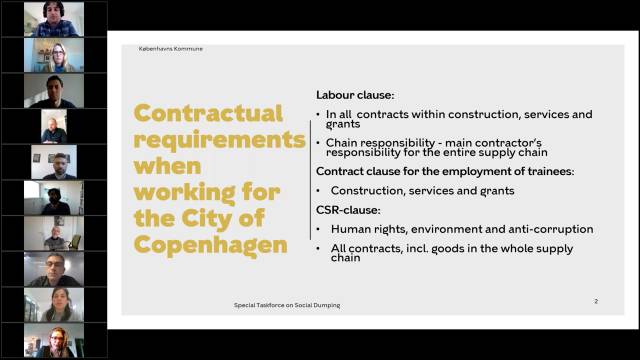The #WeBuySocialEU project, a communication campaign promoting the European Commission (EC) published report ‘Making Socially Responsible Public Procurement Work: 71 good practice cases’, concluded in February with two webinars organised by ICLEI and AEIDL. ICLEI’s webinar showcased the diverse ways in which socially responsible public procurement (SRPP) can make an impact, while AEIDL’s had a more specific focus on the benefits SRPP has for social enterprises.
During ICLEI’s webinar (held on 11 February), the city of Copenhagen and the Catalan Association of Municipalities (ACM) both explained how SRPP can create better labour conditions for workers. The Danish capital achieved this by using labour clauses in the contract it signed with the City’s suppliers and their subcontractors, while ACM used social clauses requiring contractors to perform due dilligence to achieve supply chain transparency and comply with labour rights in the production chains.
Further speakers included the City of Wageningen, which incorporated social return in public contracts by emplying people with a distance to the labor market, and social enterprise GECCO, which had developed a partnership with the Municipality of Lille for the production of biodiesel from used food oils. How public procurement can be an opportunity for social economy enterprises was addressed in more detail during AEIDL’s webinar (on 23 February), which was co-hosted by Social Economy Europe.
The webinar’s main examples came from Spain and Lithuania. Firstly, the city of Valladolid decided to develop a strategy based on transparency and simplified procedures to have a smarter use of its budget including environment, innovation and social issues. This allowed to improve the percentage of SMEs who were awarded public contracts. The city of Kaisiadorys developed another approach of SRPP with pre-market consultation to ensure a high proportion of SMEs and social economy enterprises in the tenders by promoting collaboration between economic operators.
The cases from Kaisiadorys and Valladolid are important good practice examples for the EC. While it has been working on using public procurement as a policy tool to help citizens achieve social and environmental goals, ensuring the accessibility to public markets of SMEs and social economy enterprises has been one of its biggest challenges. Raising awareness of the benefits of SRPP for them has been one of the aims of the report. In addition, the report aimed to show that public buyers who want to use their purchases to strategically deliver positive social outcomes, have a wide range of applications, mechanisms and opportunities to choose from.
In addition to the two webinars, in the final month of the #WeBuySocialEU campaign, a video was produced featuring interviews with public buyers from the cities of Rotterdam (the Netherlands) and Rzgów (Poland) who implemented social considerations in their public contracts.
More information on SRPP can also be found in the FAQ document, answering 15 of the most relevant questions about SRPP. The document can be downloaded here.
For more information, please write to amalia.ochoa@iclei.org.





